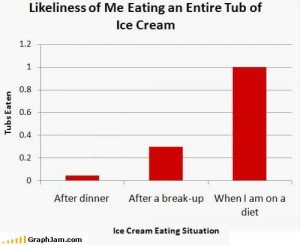Starving is bad. No matter what diet you are on and no matter what goals you pursue, the eternal feeling of hunger is a bad helper. In this article you will find useful tips and recommendations on how to satisfy hunger without overeating.
A typical picture: you are on a diet — and you are constantly wildly hungry, downright hungry. In the evening, having discovered that today you still have a limit of a couple hundred calories, you rush between the refrigerator and all sorts of breadcrumbs, painfully calculating in your mind and choosing the lesser of evils. After 15-30 minutes of such tossing, you usually:
— you knock over a glass of water and hurriedly leave the kitchen
— you gnaw a lettuce stalk, trying to convince yourself that it tastes like chicken
— tell yourself: "Fuck it all!" and from the belly you overeat with various harmful goodies like chocolate ice cream
The probability of such a breakdown is well shown in this picture, comic and vital at the same time:

1. After lunch
2. After the breakup of the relationship
3. If you are on a diet
Our body resists artificial restrictions, that's how it works. The body is afraid of starvation and sees it as a direct threat to its own existence, and therefore actively gives us various signals and tries to make up for the "half-eaten". It sounds like a mockery for people who are trying to lose excess weight, and yet, a fact.
But there is also good news: the body can be deceived, and the feeling of hunger can be satisfied without absorbing a bunch of extra calories, if you approach the matter wisely. Let's move on to specific foods and recipes that can make it easier for you to stay on a diet.
The benefits of protein have been talked about and written about a million times. It helps to build muscles, it suppresses hunger, it has a so-called "thermal effect" (a large amount of heat is needed to digest protein), and in general is an indispensable component in any diet. In short, squirrels are the first of the three whales we will rely on.

"Are you spending apartment money on protein powder?
Are there no brains at all?"
Low—calorie protein sources:
- pitted and skinless chicken breast: yes, it is lean and boring, but it contains a lot of protein, few calories, and also satisfying
— turkey, beef, pork tenderloin
— fish: it is much less caloric than many other foods rich in protein, and portions can be made a little more. This is especially true of the "white" fish. Of course, in order for the fish to be delicious, you can not do without some seasonings: do not be afraid to be creative.
— "greek" yogurt: not everyone likes its taste, and different people need different amounts of this product to saturate. However, this wonderful yogurt contains a lot of protein, there are no calories in it, and you can easily make a delicious dessert out of it.
— 1% cottage cheese: as in the case of yogurt, the saturation effect of low-calorie cottage cheese is individual. Moreover, many people simply can't eat it because of the taste, they literally start to feel sick. It's a pity, because from the point of view of dietary nutrition and protein content, this is an excellent product.
— protein supplements: a good way to get the necessary amount of protein. Some manufacturers add flavors to this product, so it turns out quite edible.
— egg substitutes: great stuff. If they are properly cooked and add some greens, it will be satisfying, tasty and low-calorie. You can cook in the microwave for more softness.
— egg white: an omelet made of proteins with the addition of vegetables and lean pieces of meat is an excellent option for a dietary breakfast. Lots of protein, few calories, nutritious and delicious.
Perhaps the most controversial point in the preparation of a diet. Someone is trying to reduce their consumption to zero, someone is looking for balance, someone alternates periods of carbohydrate consumption with periods of abstinence. Nevertheless, here is a list of foods that are rich in this substance, but are suitable for many diets.
— starch-based products: oatmeal (and oatmeal derivatives), boiled potatoes (one of the top products for satisfying hunger), low-calorie popcorn (yes, one bag of such popcorn can contain only 240 calories), legumes, carrots. Yes, carrots are considered very high in calories, but since it is quite difficult to chew them, you still won't eat much, but you will drown out hunger.
— Fruits (let's list the most satisfying):
Strawberries – 450g is ~140 calories
Musk melon – 1 in one large melon ~230 calories
Watermelon – in several good pieces of watermelon (a little more than half a kilo) ~230 calories
Oranges – in 1 orange ~80 calories
Grapefruit – in 1 grapefruit ~100 calories
Apples – in 1 medium-sized apple ~80 calories
Papaya – 1 medium papaya contains ~120 calories
Grapes (of course, frozen) — 200g contain ~160 calories
— Vegetables: Of course, vegetables should make up a large part of your diet on a diet. Many people think that vegetables kind of "don't count" and you can eat them as much as you like. This is not true, vegetables also have calories. Here is a list of vegetables that, according to the author, best satisfy hunger and at the same time do not harm the diet:
Broccoli and cauliflower — you will be surprised, but slightly boiled broccoli and raw cauliflower are considered by many to be a very good option for satisfying hunger. Why? These vegetables are rich in fiber, it is difficult to chew them undercooked, and, frankly, they taste like an amateur.
Ordinary cabbage and lettuce are a wonderful side dish, many cooking options, tasty, healthy and nutritious.
Kimchi is an exotic thing for us. Wonderful taste, low calories and a lot of benefits for the body. If you have the opportunity to buy kimchi (for example, in the Asian market), do not neglect it, it's really delicious.
Cucumbers, Chinese cabbage, bamboo shoots, zucchini, red and green peppers, spinach and onions are also excellent ingredients for a diet menu. About onions, I would like to note separately that this is a real gift from heaven for those who are on a diet. It gives a taste to even the most bland food, and sometimes it can save an absolutely failed culinary experiment. Let's finish this list with dill, tomatoes, pumpkin, celery and pickles (a mixture of small vegetables rolled into a jar)

Does anyone want pickles?
But with fats, everything is sad. The list of products that may contain them, but are not harmful / high-calorie, is very short: meat (not lean), yoghurts and cottage cheese, hard-boiled eggs and all the same fish and fish oil. If you can expand it, don't hesitate.
Things like barbecue sauce, cheese sauce, ketchup or (oh my God!) mayonnaise can kill any, the best diet and cause only harm to the body. However, there are some seasonings that can give your dishes a sharpness and relish, while not being high-calorie:
— yellow mustard
— lemon juice
— vinegar
— spices
— horseradish
— salsa (sauce)
— soy sauce
— sugar substitutes, sweeteners
A few words about drinks. Oddly enough, the feeling of hunger can often be drowned out with liquid. A small amount of tea, coffee, almond milk or just water will create an illusion in the body, albeit for a short time, that it has ceased to be limited.
From one very useful book about willpower training, the author has made some useful tips and tricks for those who are on a diet.
1. Find the optimal ratio of the frequency of meals and the volume of portions. For someone, frequent meals in small doses are suitable. Someone prefers to arrange for himself three or four full-fledged "feeding".
2. Be flexible in matters of diet. Sometimes it is better to allow yourself a step to the left, a step to the right, than to strictly monitor the implementation of each small item, and then hate diets and abandon this business.
3. Eat with your left hand (if you are left—handed, respectively - with your right).
4. Outline the boundaries that should not be violated. For example, instead of convincing yourself "I will drink less beer", set firmly: "From now on I will drink beer only on Fridays and Saturdays. Maximum of 2 cans per evening."
5. Learn to tell yourself: "I'll eat this later." It is much more pleasant than the severe self-restraint "I will never..." For example, before a party, do not depress yourself with thoughts like "I won't eat anything here." Tell yourself: "I'll eat tonight, but a little later."
6. Tell your friends and family that you are on a diet. If you have an online diary or blog, write about it in the status. This technique greatly increases motivation, because now you report on your successes not only to yourself.
7. Floss or brush your teeth not only after eating, as usual, but also instead. A simple trick with conscious self-deception, however, for many people it turns out to be quite effective.
8. Be busy all the time, don't go limp. To sit and gloomily poison yourself with thoughts of forbidden and unhealthy food is unconstructive. Learn to be distracted, switch to hobbies, work or other things.
Whatever diet you choose, you know: it will be difficult. There will be pros and cons, ups and downs, be prepared for them. Remember that if you have a goal, strong motivation and a well—developed strategy, then everything will definitely work out. Necessarily.